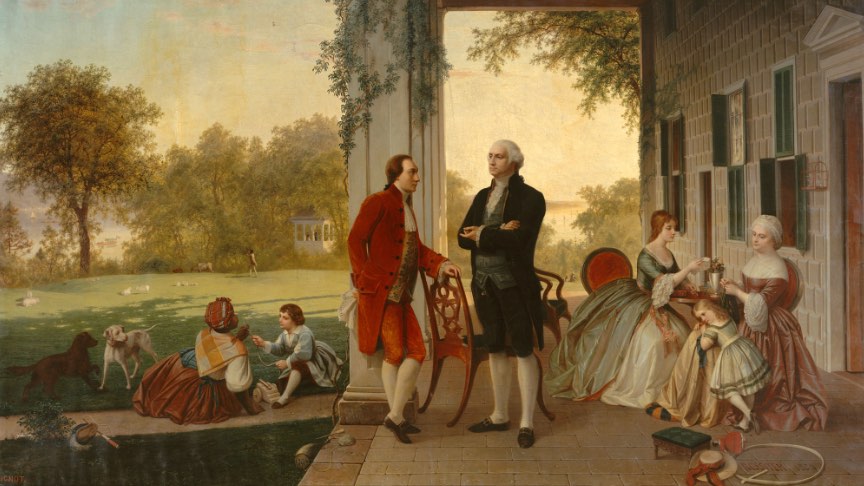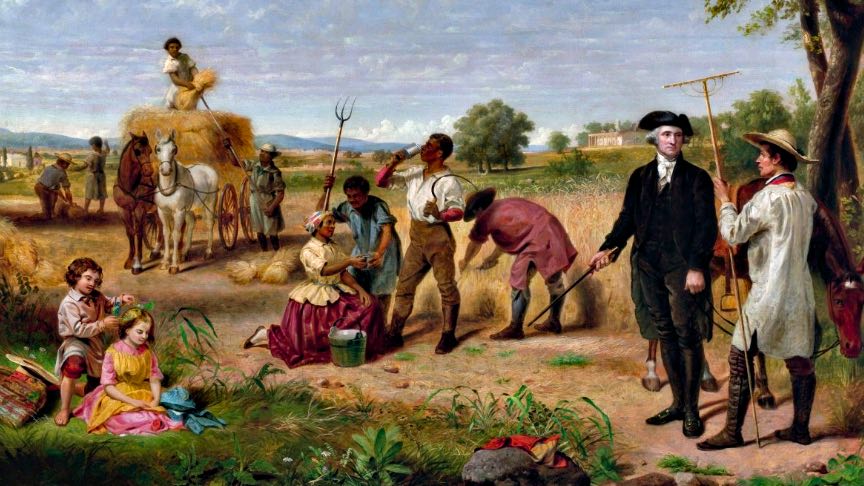There is much illogic and misrepresentation at play in these sentiments, but they nonetheless have a certain power to control the mind of the ill-educated and misinformed. Certain facts may be simple and useful correctives, however.
One of these, not as well known as it should be, is that the slave owing American Founding Fathers were generally opposed to slavery and hoped to abolish it. Let’s consider two of these Founders: George Washington and the Marquis de Lafayette.
Washington, of course, was the great general who bears singular responsibility for the success of the American Revolution in defeating the British Empire — then the greatest military empire on earth — and creating the conditions for the future success of the country. His undertaking was not merely one of battlefield command, though it certainly had its fair share of this. In fact, Washington’s efforts to lead the Revolution were all encompassing and included diplomacy with European nations as well as leadership in areas of domestic development including commercial policy, trade, law and government and even physical infrastructure and agriculture.

Lafayette, meanwhile, was a Frenchmen, and yet he was a strong supporter of the American Revolution and a close colleague of the Founders, including Washington. He volunteered for the Continental Army under Washington and commanded troops, even being wounded in battle for the American cause.
These two men, so crucial to the establishment of the Republic that led ultimately to the adoption of the U.S. Constitution and its unique recognition and protections of individual rights, were opponents of slavery.
The matter was addressed by Washington in a letter to Lafayette on May 10, 1786. Previously, word had reached Washington that Lafayette had hatched a plan to free a number of slaves. In the letter he wrote to Lafayette, he addressed the issue:
The benevolence of your heart my Dr. Marqs. is so conspicuous upon all occasions, that I never wonder at any fresh proofs of it; but your late purchase of an estate in the colony of Cayenne, with a view of emancipating the slaves on it, is a generous and noble proof of your humanity. Would to God a like spirit would diffuse itself generally into the minds of the people of this country; but I despair of seeing it. Some petitions were presented to the Assembly, at its last Session, for abolition of slavery, but they could scarcely obtain a reading. To set them afloat at once would, I really believe, be productive of much inconvenience and mischief; but by degree it certainly might, and assuredly ought to be effected; and that too by legislative authority.
Lafayette did, in fact, begin his effort to free the slaves he had acquired with the plantation in what is now French Guiana. He was unable to fully realize this goal as events in the French Revolution interfered. Though his wife continued the effort, when Lafayette was imprisoned in 1792 his properties were confiscated and those slaves he had freed were again enslaved.
For his part, Washington was clear — though he had inherited slaves and was thus a slave owner himself — he had larger hopes than private emancipation of just some slaves, but desired the legislature to act to free all slaves. He perceived that this might only come as the result of a gradual process because a precipitous emancipation might prove to be an event that would lead to widespread devastation, something in the polite and formal discourse of his era he called “much inconvenience and mischief.” Keep in mind, this language comes from a man who had just witnessed and participated in a great deal of this kind of “inconvenience and mischief” during the Revolutionary War. He was here speaking as a veteran with direct experience that the modern mind may find difficult, if not impossible, to comprehend.
His worries that an immediate emancipation would lead to disaster proved to be well-founded in the end. The American Civil War that finally rid the nation of the evil of slavery proved to be one of the more bloody and devastating wars in history, and one which hinted at what was to come as modern warfare entered the world scene with World War I.
Ultimately, it was the opinions and actions of the Founding Fathers including leaders like Washington and Lafayette that finally created the possibility — and then the reality — that slavery could be abolished.
Rather than excoriate the Founding Fathers for the world they inherited that included slavery, we should look to them as the heroes who took the first steps to rid the world of that great evil.


